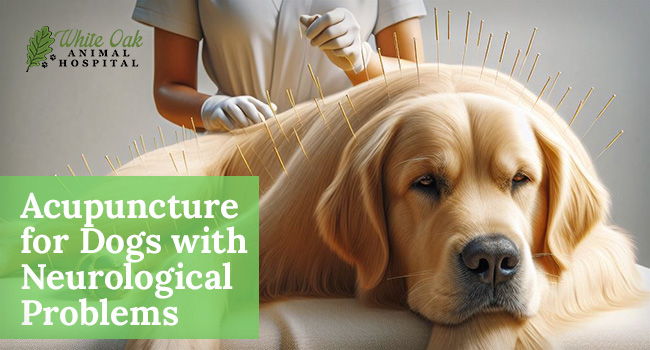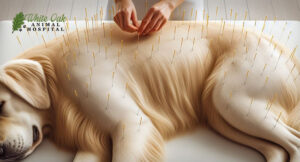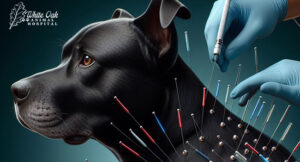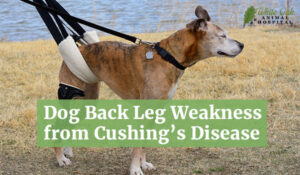
The growing interest in acupuncture for dogs with neurological problems reflects a broader shift toward holistic and integrative approaches to pet care. As pet owners seek alternative treatments to complement traditional veterinary medicine, acupuncture emerges as a valuable option for managing neurological problems in dogs.
In recent veterinary practice, acupuncture has gained considerable attention as a promising intervention for addressing various health concerns in dogs, particularly those related to neurological problems. Acupuncture for dogs with neurological problems involves the insertion of thin needles into specific points on a dog’s body to stimulate natural healing processes and alleviate symptoms.
Acupuncture for dogs with neurological problems offers a non-invasive and drug-free alternative that can be used alongside conventional veterinary treatments. Research suggests that acupuncture may help improve neurological function by enhancing blood flow to affected areas, reducing inflammation, and promoting the release of neurotransmitters that regulate pain perception and nerve signaling.
Understanding Acupuncture for Dogs with Neurological Problems
 Neurological problems in dogs, including paralysis, seizures, and neuropathy, are significant concerns for pet owners. These conditions affect the nervous system, comprising the brain, spinal cord, and nerves. Recognizing the symptoms associated with acupuncture for dogs with neurological problems is vital for early intervention and effective treatment.
Neurological problems in dogs, including paralysis, seizures, and neuropathy, are significant concerns for pet owners. These conditions affect the nervous system, comprising the brain, spinal cord, and nerves. Recognizing the symptoms associated with acupuncture for dogs with neurological problems is vital for early intervention and effective treatment.
Paralysis, the loss of movement in specific body parts, and seizures, characterized by sudden, uncontrollable electrical disturbances in the brain, can significantly impact a dog’s quality of life. Neuropathy involves nerve damage leading to impaired sensation and movement and requires careful management. Acupuncture offers promise as a holistic approach to alleviating these neurological problems in dogs.
How Acupuncture Works for Neurological Problems in Dogs
 Acupuncture for dogs with neurological problems operates on the principle of stimulating specific points in the body to initiate healing processes. By inserting fine needles into these targeted points, practitioners aim to restore balance and promote overall well-being. The mechanism of action underlying acupuncture’s effectiveness in addressing neurological problems in dogs is multifaceted.
Acupuncture for dogs with neurological problems operates on the principle of stimulating specific points in the body to initiate healing processes. By inserting fine needles into these targeted points, practitioners aim to restore balance and promote overall well-being. The mechanism of action underlying acupuncture’s effectiveness in addressing neurological problems in dogs is multifaceted.
It is believed that acupuncture stimulates the release of neurotransmitters, such as endorphins and serotonin, which can help alleviate pain and improve mood. Additionally, acupuncture may enhance blood circulation to the brain and spinal cord, facilitating the delivery of oxygen and nutrients to nerve cells while removing waste products.
Furthermore, acupuncture is thought to modulate the body’s inflammatory response, reducing inflammation and swelling that can exacerbate neurological symptoms. Overall, acupuncture works holistically to support the body’s natural healing mechanisms and restore harmony within the nervous system.
Acupuncture for dogs with neurological problems involves stimulating specific points in the body to promote healing and restore balance to the nervous system. Understanding how acupuncture functions in treating neurological problems in dogs can empower pet owners to make informed decisions about their canine companions’ healthcare journey.
Specific Acupuncture Points and Techniques for Neurological Problems
When it comes to acupuncture for dogs with neurological problems, specific points and techniques are employed to address these problems effectively. Practitioners focus on several key acupuncture points throughout the dog’s body. These points correspond to areas associated with the nervous system, such as the head, spine, and limbs.
 By targeting these specific points, veterinary acupuncturists aim to stimulate the flow of energy, or qi, within the body and restore balance to the nervous system. Additionally, specialized techniques are utilized to enhance the effectiveness of acupuncture for canine neurological conditions.
By targeting these specific points, veterinary acupuncturists aim to stimulate the flow of energy, or qi, within the body and restore balance to the nervous system. Additionally, specialized techniques are utilized to enhance the effectiveness of acupuncture for canine neurological conditions.
These techniques may include electroacupuncture, where a small electric current is applied to the needles to stimulate further nerve function, or moxibustion, which involves burning a therapeutic herb near acupuncture points to promote healing and relieve pain.
Acupuncture for dogs with neurological problems offers a comprehensive approach to addressing their specific issues. Pet owners seeking alternative treatments for their furry companions can consider acupuncture a viable option to support their overall well-being.
Scientific Evidence Supporting Acupuncture for Dogs with Neurological Problems
 Scientific evidence supporting acupuncture for dogs with neurological problems offers valuable insights for pet owners considering this treatment option. Numerous studies and research endeavors have explored the efficacy of acupuncture in addressing neurological issues in dogs. These investigations have yielded promising results, indicating that acupuncture can indeed be beneficial in managing various neurological conditions.
Scientific evidence supporting acupuncture for dogs with neurological problems offers valuable insights for pet owners considering this treatment option. Numerous studies and research endeavors have explored the efficacy of acupuncture in addressing neurological issues in dogs. These investigations have yielded promising results, indicating that acupuncture can indeed be beneficial in managing various neurological conditions.
By reviewing the findings of these studies, pet owners can better understand acupuncture’s potential as a complementary therapy for their furry companions. While more research is needed to elucidate acupuncture’s mechanisms and long-term effects in dogs fully, the existing scientific evidence offers encouraging prospects for integrating this holistic approach into veterinary care.
As pet owners navigate the complexities of managing neurological problems in their dogs, they can find reassurance in the growing body of scientific literature supporting acupuncture as part of a comprehensive treatment plan.
Assessing Risks and Side Effects of Acupuncture in Canine Neurology
 When considering acupuncture for dogs with neurological problems, pet owners need to be aware of potential risks and side effects associated with this treatment. While acupuncture is generally considered safe, there are still some risks to be mindful of.
When considering acupuncture for dogs with neurological problems, pet owners need to be aware of potential risks and side effects associated with this treatment. While acupuncture is generally considered safe, there are still some risks to be mindful of.
These may include minor discomfort or bruising at the site of needle insertion and rare instances of infection or nerve damage. However, these risks are minimal when acupuncture is performed by a qualified and experienced practitioner.
Common side effects of acupuncture in canine neurology are typically mild and temporary, such as lethargy or changes in appetite. These side effects usually resolve on their own within a short period. However, it’s essential for pet owners to closely monitor their dog’s response to acupuncture and report any concerns to their veterinarian.
With proper precautions and supervision, Acupuncture for dogs with neurological problems offers potential benefits with minimal risk. Pet owners should always consult their veterinarian to determine if acupuncture is appropriate for their dog’s needs and health status.
 For pet owners seeking holistic approaches to address their dogs’ neurological problems, acupuncture emerges as a promising option. By considering acupuncture for dogs with neurological issues, pet owners can explore alternative therapies that complement traditional veterinary care. White Oak Animal Hospital is a reputable establishment offering integrative options not readily available elsewhere.
For pet owners seeking holistic approaches to address their dogs’ neurological problems, acupuncture emerges as a promising option. By considering acupuncture for dogs with neurological issues, pet owners can explore alternative therapies that complement traditional veterinary care. White Oak Animal Hospital is a reputable establishment offering integrative options not readily available elsewhere.
With over 28 years of experience, their expertise in Traditional Chinese Veterinary Medicine (TCVM) extends even to telemedicine consultations, ensuring accessibility and convenience for pet owners seeking guidance. Embracing a holistic approach to veterinary care, pet owners can find reassurance in the comprehensive services provided by White Oak Animal Hospital, empowering them to make informed decisions about their beloved canine companions’ well-being.
Frequently Asked Questions
Is acupuncture safe for dogs with neurological problems?
Yes, acupuncture is generally considered safe for dogs with neurological problems when performed by a qualified and experienced practitioner. While minor discomfort or bruising at the needle insertion site may occur, serious adverse effects are rare.
How many acupuncture sessions are typically needed to see results in dogs with neurological issues?
The number of acupuncture sessions required varies depending on the dog’s neurological condition’s severity and response to treatment. Some dogs may experience improvement after just a few sessions, while others may require ongoing treatment to maintain optimal results.
Can acupuncture be used as a standalone treatment for neurological problems in dogs?
While acupuncture can be effective as a standalone treatment for some neurological issues in dogs, it is often used in conjunction with other veterinary interventions, such as medication or physical therapy, to achieve the best outcomes. Pet owners should work closely with their veterinarian to develop a comprehensive treatment plan tailored to their dog’s needs.
Are there any specific breeds of dogs that respond better to acupuncture for neurological problems?
No evidence suggests that specific dog breeds respond better to acupuncture for neurological problems. Acupuncture can benefit dogs of all breeds and sizes, provided they are suitable candidates for treatment based on their overall health status and condition.
Related Posts
-
Acupuncture Pet Clinic in Fairview: Unlock the 4 Powerful Benefits of Acupuncture
Finding the best acupuncture pet clinic in Fairview can be difficult. In recent years, interest…
-
Cat Liver Problems and Herbal Solutions
Cat liver problems are extremely common. Firstly, the liver is important for many bodily functions.…
-
How Melatonin for Dogs Promotes Relaxation
Just like people, dogs experience stress for a number of reasons. Some dogs feel nervous…
-
Why Try Food Therapy For Dogs?
Have you heard of food therapy for dogs? PET | TAO, a premium holistic pet…









